Sign the #EndFGM petition on change.org
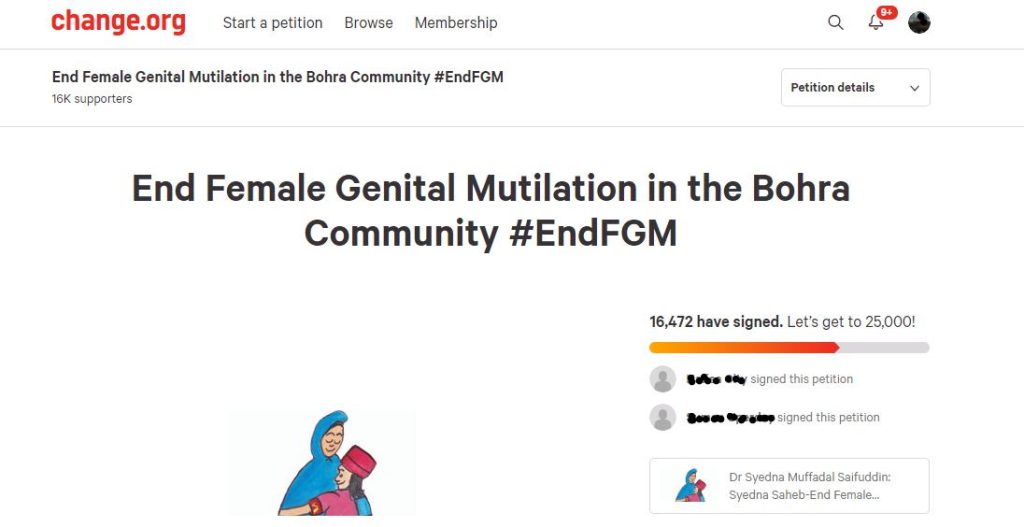
A new change.org petition calling for an end to Female Genital Cutting in the Bohra community was started in September by Ranjana Sehgal and Umi Saran. The petition is addressed to Dr. Syedna Mufaddal Saifuddin, the spiritual leader of the Bohra community, and was started in response to the Syedna’s visit to Indore to give sermons during the first ten holy days of Muharram. As the petition mentions, “Although the matter is already in the Apex Court if the directive to end FGM comes from the spiritual head of the Bohra community, it will be easier to put an end to this violent practice. The Government of India’s WCD Ministry has said that FGM is in clear contravention of our laws, the Indian Penal Code and Protection of Children from Sexual Offences (POCSO).” Over 16,000 supporters have already signed, and the campaign’s next goal is reaching 25,000 signatures. If you would like to support by signing, click here.
Sahiyo’s petition to the United Nations needs your help

In December 2016, Sahiyo started a petition with Change.org to encourage the United Nations to invest in research on Female Genital Mutilation/Cutting in Asian countries. The petition proposes to end FGM/C worldwide by 2030, and Sahiyo needs the support of 7,500 petition signers to accomplish our goal. The United Nations reports that at least 200 million women have undergone FGM/C, but their data is mostly restricted to countries in sub-Saharan Africa. FGM/C is reported in many Asian, European, and Middle Eastern nations; however, there is a considerable lack of data from these countries, which means the global scope of the problem of FGM/C remains unknown. In the past year, cases of FGM/C in Sri Lanka, India, and other Asian countries have come into the light of the media and attracted the attention of government officials. The Indian Government’s Ministry of Women and Child Development told the Indian Supreme Court that there was no official data to support the prevalence of FGM/C in India. This ruling was a massive disappointment to activists and researchers who are working to bring more research and awareness to the prevalence of FGM/C in India and Asia. Asian countries have been excluded from the UNFPA-UNICEF Joint Programme to Accelerate the Abandonment of FGM/C. With more support for research initiatives, Asian countries can conduct research, bring further awareness to the issues within their countries as well as in the global context, and propose legislative change with qualitative backing. We need about 2,000 more signers to reach our petition goal. Click this link to help us advance our mission to eradicate FGM/C in Asia and worldwide! Help us spread the word by sharing our petition within your networks.
Our Petition
(To sign petition, click here) End Female Genital Mutilation/Cutting by 2030: Invest in Research, and Support in Asia According to the United Nations, at least 200 million women in 30 countries have been subjected to Female Genital Mutilation/Cutting (FGM/C). However, these statistics are largely restricted to sub-Saharan Africa and ignore the global scope of the issue. In 2016, a UNICEF report finally included Indonesia as a country where FGM/C is practiced. The release of national data from Indonesia raised the total of girls who have undergone FGM/C from 130 million in 29 countries – as estimated in 2014 – to 200 million in 30 countries. Only 10 million of that increase was due to population growth worldwide. In Indonesia alone, half of girls under the age of 11 have gone through FGM/C. FGM/C has also been reported in India, Pakistan, Philippines, Sri Lanka, Singapore, Malaysia, Thailand, Maldives, Brunei, Russia (Dagestan), Bangladesh, and Iran and amongst diaspora populations around the world migrating from these countries. Yet, Asian countries fall outside the scope of the UNFPA-UNICEF Joint Programme to Accelerate the Abandonment of FGM/C. As a result, FGM/C survivors from this region are overlooked when it comes to resources, data collection efforts, and advocacy support. But how can we advance gender equality and stop all forms of gender violence if we are not inclusive of every country where FGM/C is reported? For Sahiyo, FGM/C isn’t a theoretical issue, it’s personal. We are an advocacy collective of South Asian survivors of FGM/C. With next to no resources and despite the backlash many of us have faced within our own communities, our advocacy work is starting to pay off. In the last year, we have place stories in mainstream publications – like the Guardian and Hindustan Times. In 2015, Sahiyo pursued a small-scale study to understand the extent of FGM/C amongst the Dawoodi Bohra Indian community and found that 80% of the women had been cut. As you can see from the video above, we are more than just overlooked data points, but survivors with agency who are reclaiming our own stories. In order to sustain the unprecedented momentum that we have built over the last year, we need the United Nations to take the issue of FGM/C in Asia more seriously. We need the international community to invest in rigorous data collection not only to better understand the scope of the problem but also to measure progress. Without reliable baselines, it is difficult to understand whether or not our interventions are working. We need to reframe FGM/C away from being a “faraway African problem” to recognizing that the problem is a reality for many communities. We know that FGM/C is rooted in controlling female sexuality and is a form of gender violence. It cuts across geography, socioeconomic class, religion, and education. We need the international community, in particular, the United Nations, to broaden the scope of its focus to be more inclusive. And we need foundations and donor countries to invest in survivor-centered approaches working on data collection, advocacy, and survivor support. Eliminating FGM/C by 2030 is a global target of the UN’s Sustainable Development Goals – it requires FGM/C prevalence to be measured in every country. To truly end FGM/C by 2030, we need all affected communities, including those in Asia, to be supported. We, a coalition of civil society organizations, now call on all relevant bodies to actively include India, Pakistan, Philippines, Sri Lanka, Singapore, Malaysia, Thailand, Maldives, Brunei, Russia (Dagestan) and Bangladesh in all relevant FGM/C campaigns and reports and to commission research on the dynamics of the practice in Asia. More Videos of Women Sharing their Stories: A Pinch of Skin Female Genital Mutilation Survivor Tells Her Story Underground: American Who Underwent Female Genital Mutilation Comes Forward to Help Others Mariya: The Heart Petition Cosigners: Sahiyo Love Matters India Healthy Tomorrow Orchid Project Equality Now Global Woman P.E.A.C.E. Foundation RAHMA FORMA Tahirih Justice Center Coptic Orthodox Diocese of the Southern United States Point of View Pastoralist Child Foundation Krantikali Men Against Violence and Abuse (MAVA) The Hands of Hope Foundation Dahlia Project Akshara No FGM Australia Chehak Trust (Sahyog) The Council for Democracy and Tolerance Saheli Bharatiya Muslim Mahila Andolan Blue Veins Men UNiTE (Men Against Violence And Abuse Alliance Beyond the Hijab Dawn Worldwide Speak out on FGM Keep the Drums, Lose the Knife Hawa Trust Sambhaavnaa Sanctuary for Families Jane Doe Inc., The Massachusetts Coalition Against Sexual Assault and Domestic Violence National Federation GAMS Women Thrive Alliance (To sign the petition, visit the petition online at Change.org by clicking here)
U.S. Muslim Leaders Stance on FGM/C (also known as Female Circumcision)
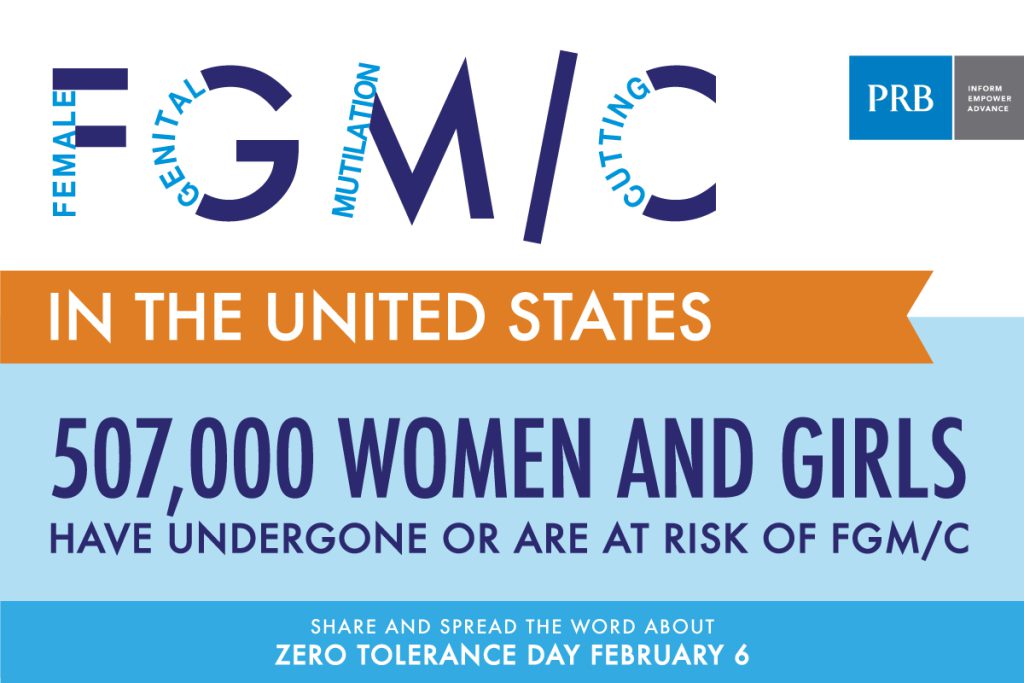
(Originally document can be found here. Republished with permission on 6/7/2017) We, Muslim organizations, FGM/C Survivors, Islamic scholars, and leaders, strongly condemn the remarks made in the video of Imam Shaker El Sayed where he clearly distinguishes between Female Genital Mutilation or Cutting (FGM/C) and female circumcision, and recommends the performance of female circumcision on young girls “when needed” to prevent them from becoming “hyper-sexual”. We commend Dar Al Hijrah on their response to these remarks condemning FGM/C. To further clarify, FGM/C is the same as female circumcision. When we refer to FGM/C, we are including female circumcision which falls within the definition of this practice. More than half a million women and girls living in the U.S are at risk of undergoing FGM/C both in the U.S. or abroad or have already undergone the procedure, including 169,000 girls under the age of 18, creating a clear urgency for action. The following presents our stance on the issue of FGM/C: FGM/C includes all forms of excision of the female genitalia. FGM/C is known as female circumcision, but they are the same practice. There is no reference to FGM/C in the Holy Quran and the practice is agains t Islam ic doctrine. According to the World Health Organization guidance from 2016, FGM/C has no health benefits and serves no medical purpose. All forms of FGM/C can cause lifelong physical, psychological and spiritual harm to the young girls forced to endure this. Because FGM/C causes harm, it is prohibited under Islam. Examples include: Physical harm: This includes health complications such as severe pain: excessive bleeding: general infections; urinary tract infections; wound healing problems; injury to surrounding genital tissue; menstrual problems (painful menstruations, difficulty in passing menstrual blood, etc.); sexual problems (pain during intercourse, decreased satisfaction, etc.); increased risk of childbirth complications; the recurring need for additional surgeries; and death Psychological harm : This includes mental illness diagnoses of depression, anxiety, and/or post-traumatic stress disorder/ low self-esteem Spiritual harm: This includes tension on one’s spiritual relationship with God and with one self; detachment from the spiritually-ordained sexual self; strain of physical and mental harm on one’s spiritual connection; feeling ostracized from one’s community as a result of feeling unworthy and ashamed Islam is a religion rooted in social justice. Arguing that FGM/C is recommended to curb the sexuality or so-called “hyper-sexuality” in females is wrong. Islam supports the sexual health of both males and females, and controlling female sexuality is a form of patriarchy, not Islam. We would like to reiterate that all forms of FGM/C are against the law in the United States. Federal Law makes it illegal to perform FGM/C in all its forms, including female circumcision on girls in the U.S or to transport a girl out of the U.S to have FGM/C performed in another country. In addition, 25 states in the U.S, including the state of Virginia, also have laws against FGM/C. We would like to make clear that FGM/C is a universally recognized human rights abuse. It is a form of child abuse, sexual assault, and gender-based violence. We, the undersigned, unequivocally stand against the practice of FGM/C. We cannot and will not stand for any leader who endorses human rights abuses antithetical to our beautiful faith. We call on all Muslim organizations to provide sexual/ reproductive health education and sexual violence awareness trainings to ensure that leaders are well equipped to serve the needs of their community. Muslim organizations must provide access to both accurate information and support resources on FGM/C and create safe spaces where open conversations about FGM/C and sexual health can take place and FGM/C survivors can share their stories and have their voices heard without judgment. Every one of us has a moral responsibility to work toward creating safer communities for our children. Support for this unjust practice under the guise of religion has gone on too long. Today, we invite you to join us in facilitating this change in the following ways: Speak up when you hear someone promoting FGM/C in the community Share information and raise awareness in mosques and other community centers Link up with other service providers to be up to date with latest policies, legislations and referral systems in your state Be visible and engage at various inter generational, multi-sectoral forums Make a commitment to educating yourself, your families , and your communities on sexual & reproductive health and sexual violence in general, and reach out to social workers, and other expert organizations when necessary Organizations that are equipped to facilitate these activities and conversations are: Dahlia Project, Face of Defiance, Safe Hands for Girls, Global Campaign to End FGM, Sahiyo, WeSpeakOut, HEART Women & Girls, and RAHMA. These organizations can be reached at: Sahiyo – info@sahiyo.com WeSpeakOut – info@wespeakout.org HEART – info@heartwomenandgirls.org Global Campaign to End FGM – Naimah@globalmediacampaign.com RAHMA – info@haverahma.org Dahlia Project – Leylatheraphy@hotmail.co.uk Face of Defiance – Leylatheraphy@hotmail.co.uk Safe Hands for Girls – info@safehandsforgirls.org DAH statement: 1- The harmful practice of female genital mutilation (FGM) is prohibited in Islam as well as the laws of the land. 2- We at Dar Al-Hijrah, DO NOT condone, promote, or support any practice of FGM. 3- The reference to “Hyper-sexuality” is offensive and it is unequivocally rejected . The Board of Directors is particularly disturbed by such comments. 4- We call upon the Muslim Scholars (clergy) to be on the forefront of the campaign against FGM and to condemn silence in the face of these harmful practices. 5- We at Dar Al-Hijrah, are committed to continue sensitivity training of our staff regarding these critical issues. The Imam of Dar Al-Hijrah, Sh. Shaker Elsayed, in response to his recent statements reaffirms that, “FGM is very harmful to women’s health, and anything in Islam that is harmful is in fact prohibited”. He also advises the community to seek their doctors counsel to inform them why it is illegal and harmful. He follows that his reference to “hyper-sexuality” is an observation that he admits he should have avoided. He declares, “I take it back, and I do apologize to all those who are offended by it”. You may refer to Imam
Speak Out on FGM petition to the UN collects more than 500 signatures
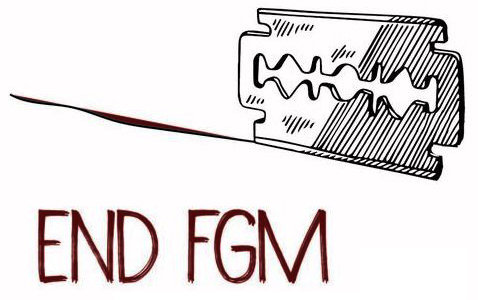
In December 2015, Speak Out on FGM – a collective of Bohra khatna survivors – launched a signature petition on Change.org, appealing to various ministers in the Indian government to end Female Genital Cutting (khatna) in India. It was the first time that 17 Bohra women had publicly come out, as signatories, to speak against the practice, and the petition helped break the silence on Khatna both in the community and the media. Today, the petition has amassed more than 83,000 supporters. A year since this pioneering petition, on December 10, 2016, Speak Out on FGM launched a new petition on Change.org, this time addressed to the United Nations. The petition was launched on Human Rights Day – the last day of the global 16 Days of Activism campaign to end gender-based violence, and it has already received 544 supporters. The new petition reflects the growing, open support for the cause of ending khatna: this time, 32 Bohra women listed their names as signatories to the petition. This petition is an appeal by survivors of khatna, calling upon the United Nations to strengthen its recognition of India as one of the countries where FGC is practiced. While UN agencies do acknowledge that FGC is prevalent in “certain ethnic groups in Asian countries…in India, Indonesia, Malaysia, Pakistan and Sri Lanka”, Indonesia is the only one of these countries that is included in the UN’s official FGC-prevalence statistic of 200 million girls cut in 30 countries. Girls cut in India are thus excluded from these statistics of global prevalence (learn more here). More global recognition of FGC would help spread awareness on the issue of khatna in India. More significantly, it would help Bohra women and men make official appeal to the Indian government to take policy-level steps to end FGC. Currently, there is no law against FGC in India, and the matter is still barely recognised as prevalent in the Indian Bohra community. Since the religious and administrative headquarters of the Bohras are located in Mumbai, and since India houses approximately half the international Bohra population of 1.5 to 2 million, ending khatna in India can go a long way in ending the practice among all Bohras. Through this petition, Speak Out on FGM hopes to speed up the process of instituting government and international mechanisms to highlight and promote measures to eradicate FGC. To sign the petition, click here.
Invest in ending FGC in Asia: Why Sahiyo and 33 organisations are petitioning the U.N.
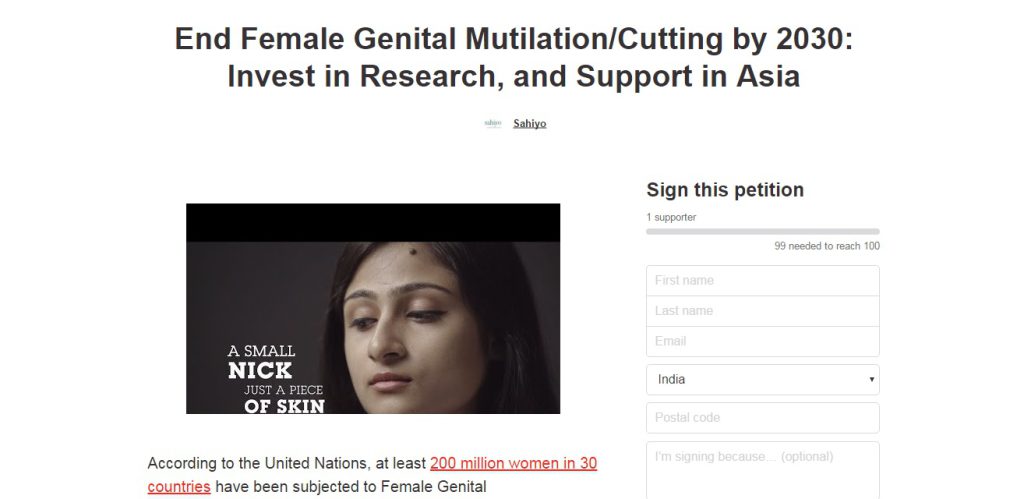
Now, a petition against khatna by UK Bohra woman

Voices against the practice of female genital cutting in the Bohra community seem to be getting louder and more numerous. The latest to speak out is an anonymous Bohra woman from the United Kingdom who was subjected to khatna as a child and remembers it as a traumatic incident. She has now launched a petition under the pseudonym “Luv Shabbir”, asking Nicky Morgan, a Member of Parliament in the UK, to do more to stop Female Genital Mutilation (FGM) in the Bohra community. This is the third online petition started by women from within the community to demand a ban on khatna for girls. The first was by the anonymous ‘Tasleem’ in 2011; the second, ongoing petition by 17 women from ‘Speak Out on FGM’ has already gained almost 30,000 supporters. Both these petitions emerged from India, where there is no law against female genital cutting and where Bohras are the only known group following the practice. In the United Kingdom, where several expat communities from Africa, the Middle-East and Asia follow various forms of FGC, the practice has been illegal since 1985. In recent years, the British government ahs been making concerted efforts to crack down on the practice. In this context, this latest petition by “Luv Shabbir” is indicative of two things: One, there is a growing desire among Bohra women to break the silence around khatna and speak out against it. Two, even in countries where there are laws against FGC, we have a long way to go before the practice meets its end. To support the UK petition, sign here.
SIGN ANTI-FGC PETITION TODAY!
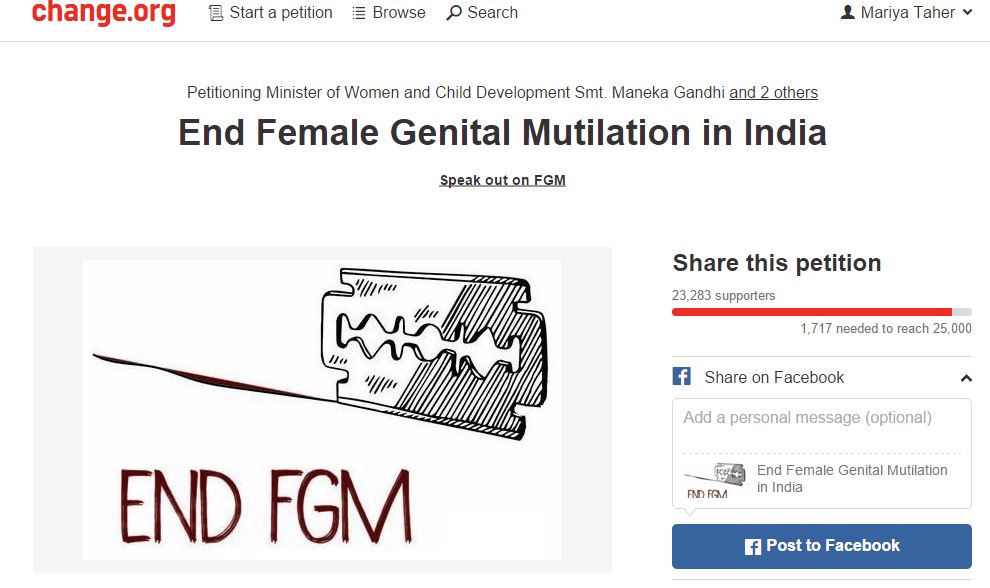
In 2011, an anonymous Bohra woman using the name ‘Tasleem’ made the first attempt to end the practice of female khatna through an online petition on Change.org. That petition was addressed to Syedna Mohammed Burhanuddin and received less than 4,000 signatures. The Bohra community has come a long way since then. On December 1, 2015, Masooma Ranalvi and 16 other Bohra women from around the world launched another petition – this time addressed to various ministers in the Government of India – demanding a law against Female Genital Mutilation as practiced by Bohras in India. This was the first time that such a large number of women from the community decided to discard their anonymity and publicly speak out against a practice that has affected them. The petition managed to get more than 2,000 signatures in the first two days itself, and has garnered more than 23,000 supporters so far. More notably, it has received plenty of attention and support from various media organisations, including Mumbai Mirror, DNA, Huffington Post, Scroll.in, and BBC. To sign the petition now, click here.
